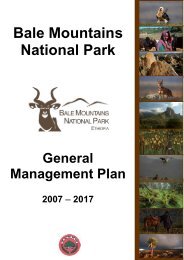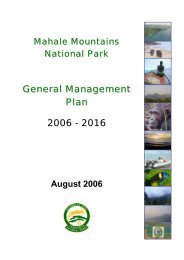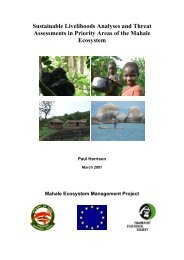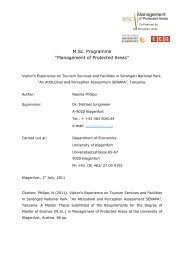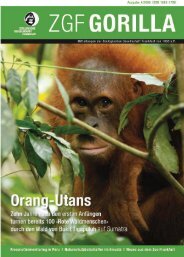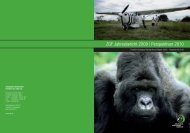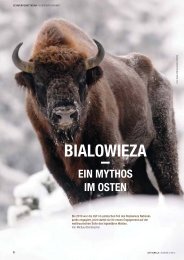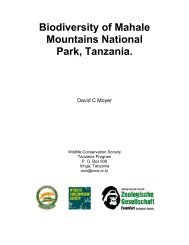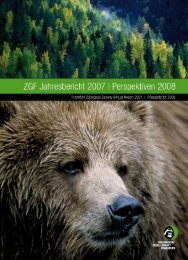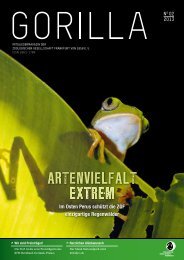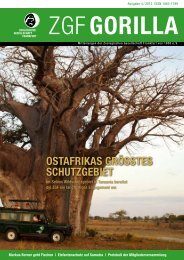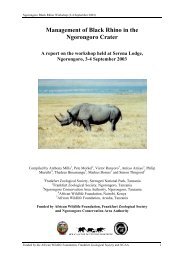Walia Special Edition on the Bale Mountains (2011) - Zoologische ...
Walia Special Edition on the Bale Mountains (2011) - Zoologische ...
Walia Special Edition on the Bale Mountains (2011) - Zoologische ...
Create successful ePaper yourself
Turn your PDF publications into a flip-book with our unique Google optimized e-Paper software.
sets, extract relevant bits of informati<strong>on</strong>, and generate reports.<br />
In <strong>the</strong> case of nati<strong>on</strong>al parks, data may be as simple as <strong>the</strong> size of <strong>the</strong> park, or <strong>the</strong> number<br />
of visitors coming to <strong>the</strong> park. The informati<strong>on</strong> can become as complex as needed. For example,<br />
a park warden may want to analyze <strong>the</strong> relati<strong>on</strong>ship between <strong>the</strong> financial support <strong>the</strong> park’s<br />
community outreach program provides villages and number of people violating park regulati<strong>on</strong>s.<br />
Providing <strong>the</strong> data were collected and entered properly, a database would make this analysis easy<br />
and straightforward, and would provide a powerful tool for assessing <strong>the</strong> effectiveness of community<br />
outreach program. Fur<strong>the</strong>rmore, depending <strong>on</strong> <strong>the</strong> design of a database, reporting and routine<br />
summaries can be totally automated.<br />
There are many database software programs available <strong>on</strong> <strong>the</strong> market today that vary in price,<br />
efficiency, and user-friendliness. The most comm<strong>on</strong> <strong>on</strong>e for small databases is Microsoft Access,<br />
which is readily available. There are several larger commercial databases that are more complex<br />
but also more powerful such as Microsoft SqL, FoxPro, DB2, Oracle, Ingres, and PostgreSqL.<br />
MySqL is a free database that can be downloaded from <strong>the</strong> Internet. It is a very powerful system<br />
which is widely used, making it an attractive database for low budget organizati<strong>on</strong>s.<br />
Why M<strong>on</strong>itor?<br />
Collecting informati<strong>on</strong> can at times be l<strong>on</strong>g and tedious, so what benefits are gained by m<strong>on</strong>itoring?<br />
In actual fact <strong>the</strong>re are many. The collecti<strong>on</strong> of data, especially over a l<strong>on</strong>g time, gives a park what’s<br />
called instituti<strong>on</strong>al memory. In o<strong>the</strong>r words, it provides a source of knowledge that will l<strong>on</strong>g outlast<br />
any of <strong>the</strong> rangers, managers, or researchers. Many ecological processes occur <strong>on</strong> scales that are<br />
well bey<strong>on</strong>d human lifetimes (Sinclair et al. 2000; Sinclair et al. 2007) and cataloguing <strong>the</strong> state of<br />
an ecosystem over l<strong>on</strong>g periods of time enables us to understand <strong>the</strong>se dynamics. A database allows<br />
us to recall <strong>the</strong>se occurrences and learn from <strong>the</strong>se events, even though we pers<strong>on</strong>ally may never<br />
have experienced <strong>the</strong>m. Therefore, we are building <strong>on</strong> our knowledge over time, ra<strong>the</strong>r than forcing<br />
each generati<strong>on</strong> to re-learn it.<br />
Managers in protected areas are c<strong>on</strong>stantly presented with choices. Where should we place<br />
tourist lodges? Which villages should we support this year? Are we being efficient in catching<br />
poachers? Experience allows managers to make good choices, but often a manager is forced to<br />
make a decisi<strong>on</strong> <strong>on</strong> something with which <strong>the</strong>y have little or no experience. In o<strong>the</strong>r words, <strong>the</strong>y are<br />
forced to guess, and in some cases <strong>the</strong>y have <strong>the</strong> luxury of making an educated guess (Walters 1986).<br />
For park management, <strong>the</strong>re are no clear answers to most questi<strong>on</strong>s, however we can learn from<br />
our previous choices provided we have documented <strong>the</strong>m. For instance, a recent article analyzing<br />
<strong>the</strong> anti-poaching effort in <strong>the</strong> Serengeti Nati<strong>on</strong>al Park in Tanzania for <strong>the</strong> last 40 years shows that<br />
small increases in <strong>the</strong> number of rangers patrolling resulted in disproporti<strong>on</strong>ately more poachers<br />
being caught than you would expect (Hilborn et al. 2006). This tells us about <strong>the</strong> efficiency of antipoaching<br />
patrols and provides useful informati<strong>on</strong> as to where to c<strong>on</strong>centrate resources. Having<br />
access to informati<strong>on</strong> means that managers can answer questi<strong>on</strong>s with greater c<strong>on</strong>fidence.<br />
<str<strong>on</strong>g>Walia</str<strong>on</strong>g>-<str<strong>on</strong>g>Special</str<strong>on</strong>g> <str<strong>on</strong>g>Editi<strong>on</strong></str<strong>on</strong>g> <strong>on</strong> <strong>the</strong> <strong>Bale</strong> <strong>Mountains</strong> 307



